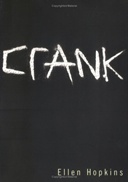 Crank
CrankEllen Hopkins
Ellen Hopkins' young adult novel is told in blank verse. This 400-page paperback is composed of short poem-like chapters, frequently with just a few words per page, with plenty of blank paper between short sentences and verse-like paragraphs. Compressed, the book wouldn't amount to 100 pages. I started reading at noon and was done by seven in the evening, with multiple breaks and time out for dinner and the Rachel Maddow Show.
Which is not a complaint, mind you. Some of the verse chapters are beautifully done and indeed can stand alone as poetry. I'm just saying, to any teenager who sees this thick paperback on the shelf, don't be intimidated by its size ... it's a quick read.
The story of Kristina and her alter-ego Bree was immediately familiar to me from my own teenaged reading. We had YA books like this when I was in high school in the 1960s, scary morality tales about teenaged boys and girls succumbing to temptation, the physical and mental horrors of going bad, and the slow climb back to redemption. Our books didn't have meth, granted, but they did have alcohol, marijuana, and heroin. And our books had teen pregnancy and the dangers of falling in with the wrong crowd, just as Ellen Hopkins' book does.
So other than the verse format, there's nothing new here. The story pulls you in, horrifies you (or tries to) with the details of Bree's plunge into wild girl behavior and meth addiction, and rewards you with her decision to have her baby, kick the habit, and become Kristina again. I think I caught a whiff of anti-abortion zealotry in the chapters about her visit to Planned Parenthood, but I could be mistaken. Nevertheless, that section of the book read like pro-life propaganda to me.
So why was Ellen Hopkins one of the most challenged authors of 2009 and 2010, according to the American Library Association? Why have some of Ellen Hopkins' scheduled school appearances been cancelled at the last minute? Why was she so famously dis-invited from a teen literature festival in Texas, a festival that was later cancelled after other authors protested her treatment by school board officials?
I dunno. I'm stumped. There's some sex in Crank, true, but no detail, nothing like the graphic and positive descriptions of sex you'll encounter in, say, a Judy Blume YA novel. And Bree gets pregnant the very first time, a classic trope of moralizing teen literature. Yes, there's the meth, but that too is presented from a moral angle, and as I mentioned, there's plenty of precedent for books warning teenagers about the dangers of drug use by describing the gritty, wasted lives of junkies. The word "fuck" appears maybe three times in 400 pages. So what's the problem?
The problem, it appears, is a growing hover-parent movement against "dark" YA literature (you can read about that movement in this Wall Street Journal article: Darkness Too Visible). There's no denying Ellen Hopkins' books are dark. They're also popular with teens. That puts them in the crosshairs of the anti-dark hover-parents. That appears to be the extent of it. Unless it's that pesky f-word.
Psst, hover-parents: if I was a teenaged girl and I heard that Crank or any of Ellen Hopkins' other books had been taken off my school library shelves, I'd run right down to the local public library and check out a copy. And if I was a parent with a teenaged girl living at home, I'd go check it out for her. So whatever it is you think you're doing? It ain't working.











5 comments:
I love that people who ban books don't realize they are just driving up sales of that book and that they make it so much more interesting for students. This one, as well as Hopkins' other books, are very popular at the school where I teach
Great review - and I agree with Helen - all they do by trying to call this book out as "bad" is draw attention to it.
I have not read Hopkins but looks like I should for this years banned books week.
I don't think most people realize that a good number of teens by the time they are in High School start reading adult novels. That was my experience anyway... Ah! its not the 1950s!
Beth, I agree, but it's also true that YA novels are still enormously popular with young readers -- it's a huge segment of the book publishing industry, so someone's reading them. I'm reading another popular YA book now, Natasha Friend's Lush, trying to figure out why anyone would want to prevent teenagers from reading it. Book report coming soon.
A couple of the boys in my son's Scout group have read this. It's been one that's been on my radar for a while but the size of it scared me. Good to know it's written in prose like style. Great review!
Post a Comment